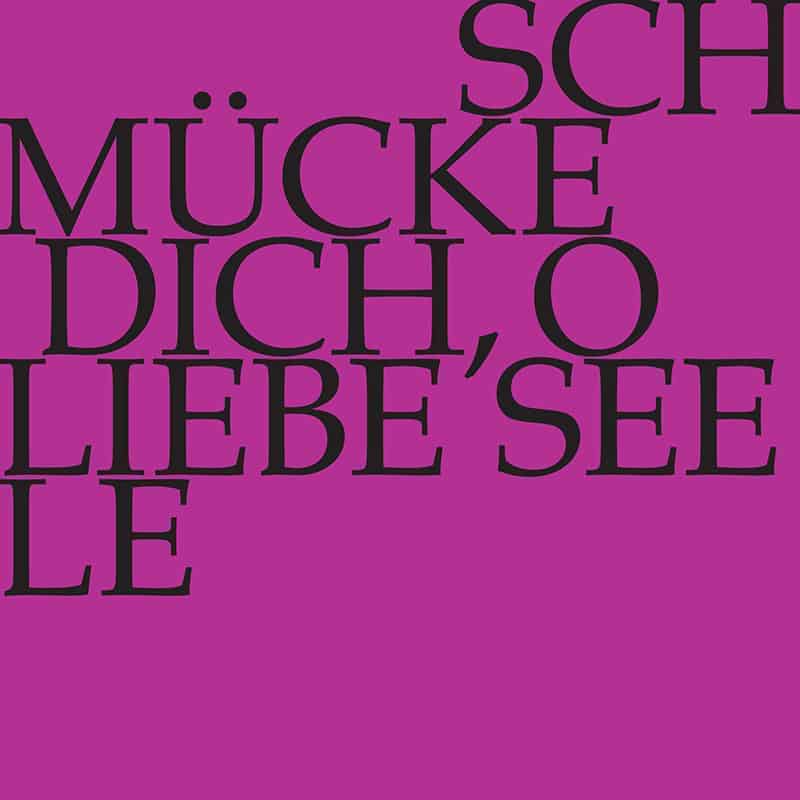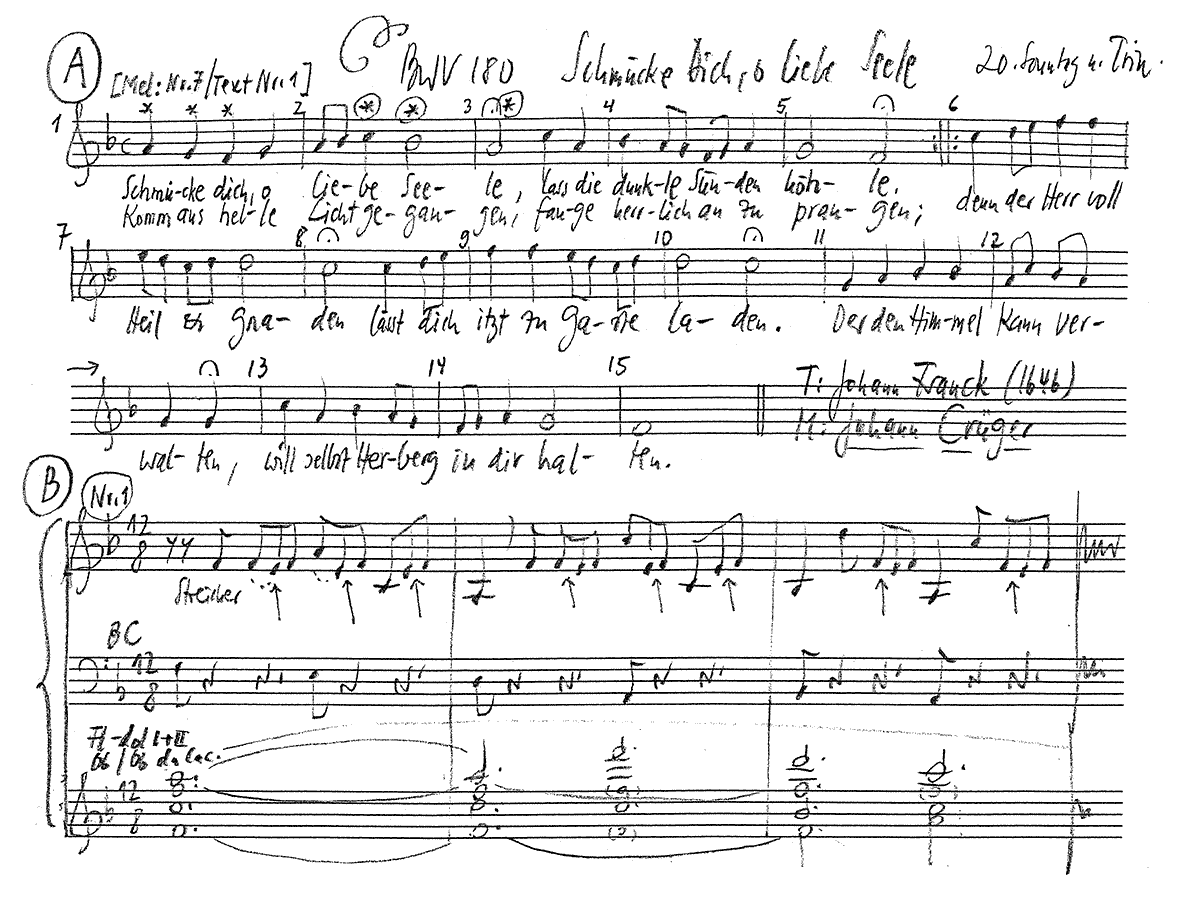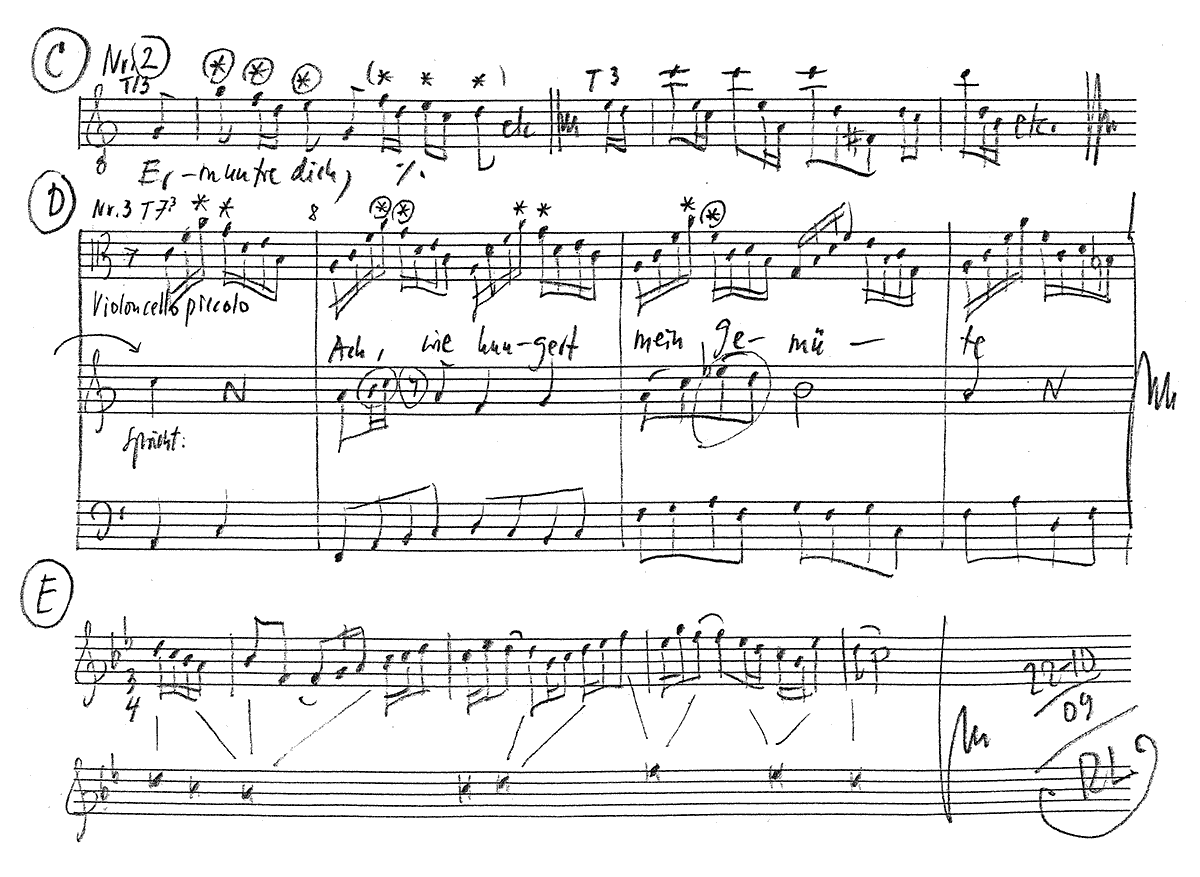Schmücke dich, o liebe Seele
BWV 180 // For the Twentieth Sunday after Trinity
(Deck thyself, O soul beloved) for soprano, alto, tenor and bass, vocal ensemble, recorder I+II, flute, oboe, oboe da caccia, bassoon, strings and continuo.
The two great Bach experts Robert Schumann and Felix Mendelssohn must have mused one day over Bach’s famous organ chorale “Schmücke dich, o liebe Seele” (BWV 654). As later recalled by Schumann, Mendelssohn had confided to him that should he ever feel all was lost in this life, this chorale alone would restore it to him. Written in a consoling, Trinitarian E flat major, the uplifting effect this work had on Mendelssohn was perhaps not only the result of Bach’s ingenious organ composition, but also the enchanting beauty of the chorale text by Johann Frank and its musical setting by Johann Krüger from 1649. Whatever the case may be, upon listening to the cantata BWV 180 “Schmücke dich, o liebe Seele” (Deck thyself, O soul beloved), it is difficult to shake the impression that this Communion hymn also inspired Bach to create a work of spiritual fulfilment and joy.

Would you like to enjoy our videos ad-free? Subscribe to YouTube Premium now...
Workshop
Reflective lecture
Choir
Soprano
Susanne Frei, Guro Hjemli, Damaris Nussbaumer, Noëmi Tran Rediger
Alto
Jan Börner, Antonia Frey, Olivia Heiniger, Lea Scherer
Tenor
Clemens Flämig, Manuel Gerber, Walter Siegel
Bass
Matthias Ebner, Fabrice Hayoz, Oliver Rudin
Orchestra
Conductor
Rudolf Lutz
Violin
Renate Steinmann, Plamena Nikitassova, Anaïs Chen, Sabine Hochstrasser, Olivia Schenkel, Livia Wiersich
Viola
Susanna Hefti, Emmanuel Carron
Violoncello
Martin Zeller
Violoncello piccolo
Christophe Coin (special Guest)
Violone
Iris Finkbeiner
Oboe
Stefanie Haegele
Oboe da caccia
Luise Baumgartl
Bassoon
Susann Landert
Transverse flute
Claire Genewein
Recorder/Flute
Armelle Plantier, Priska Comploi
Organ
Norbert Zeilberger
Musical director & conductor
Rudolf Lutz
Workshop
Participants
Karl Graf, Rudolf Lutz
Reflective lecture
Speaker
Monica Rüthers
Recording & editing
Recording date
10/23/2009
Recording location
Trogen
Sound engineer
Stefan Ritzenthaler
Director
Meinrad Keel
Production manager
Johannes Widmer
Production
GALLUS MEDIA AG, Switzerland
Producer
J.S. Bach Foundation of St. Gallen, Switzerland
Librettist
Text No. 1, 3 (Choral), 7
Johann Franck (1618–1677)
Text No. 2–6
Arranger unknown
First performance
Twentieth Sunday after Trinity,
22 October 1724
In-depth analysis
Set in a lively 12⁄8 metre, the introductory chorus is particularly transparent in sound, comprising loosely intertwined string and woodwind lines inspired by the chorale theme. Although the three lower choir voices accompany the soprano melody with a demanding contrapuntal trio, the work is free of all stringency. Everything seems to trill and breathe – as if the listener were entering a lovingly tended village church with colourful windows and creaking wooden galleries on a bright summer morning. With this opening, Bach captures perfectly the pure grace of the gospel.
The tenor aria “Be lively now: thy saviour knocks”, is infectiously joyous in character. The spirit of the introductory chorus continues seamlessly with an irresistibly charming invitation delivered by the solo tenor, transverse flute and continuo in a lively concertante interplay. In this movement, Bach’s captivating setting of the saviour’s “knocking” on the “doors of your heart”, not to mention the believing soul that is rendered almost speechless by “enchanted joy” is no less than masterly. And yet his kaleidoscope of colours is far from exhausted – the following recitative melds into an extended chorale aria that is imbued with a particularly tender light by the violoncello obbligato, while the intense, yearning tone of the text (“Ah, how hungry is my spirit, friend of man, to have thy kindness”) finds both encouragement and fulfilment in the succinct elegance of the cantabile string voice. The next recitative, which speaks of humankind’s wonder at the profound majesty of the act of Communion, is given a peaceful, yet celebratory ambience by the obbligato recorders. In the full orchestral splendour of the ensuing soprano aria, all doubt is swept away and the closing chorale “Jesus, bread of life most truly” emerges as a musical portrayal of the unity in faith and the promise of the great heavenly banquet.
The relatively high number of earlier versions and the possibly associated loss of the original parts indicate that this cantata, written for the Twentieth Sunday after Trinity 1724, probably – and most deservedly – enjoyed a fair degree of popularity in its time.
Libretto
1. Chor
Schmücke dich, o liebe Seele,
lass die dunkle Sündenhöhle,
komm ans helle Licht gegangen,
fange herrlich an zu prangen;
denn der Herr voll Heil und Gnaden
lässt dich itzt zu Gaste laden.
Der den Himmel kann verwalten,
will selbst Herberg in dir halten.
2. Arie (Tenor)
Ermuntre dich, dein Heiland klopft,
ach, öffne bald die Herzenspforte!
Ob du gleich in entzückter Lust
nur halb gebrochne Freudenworte
zu deinem Jesu sagen musst.
3. Rezitativ & Choral (Sopran)
Wie teuer sind des heilgen Mahles Gaben!
Sie finden ihresgleichen nicht.
Was sonst die Welt
vor kostbar hält,
sind Tand und Eitelkeiten;
ein Gotteskind wünscht diesen Schatz zu haben
und spricht:
Ach, wie hungert mein Gemüte,
Menschenfreund, nach deiner Güte!
Ach, wie pfleg ich oft mit Tränen
mich nach dieser Kost zu sehnen.
Ach, wie pfleget mich zu dürsten
nach dem Trank des Lebensfürsten!
Wünsche stets, dass mein Gebeine
sich durch Gott mit Gott vereine.
4. Rezitativ (Alt)
Mein Herz fühlt in sich Furcht und Freude;
es wird die Furcht erregt,
wenn es die Hoheit überlegt,
wenn es sich nicht in das Geheimnis findet,
noch durch Vernunft dies hohe Werk ergründet.
Nur Gottes Geist kann durch sein Wort uns lehren,
wie sich allhier die Seelen nähren,
die sich im Glauben zugeschickt.
Die Freude aber wird gestärket,
wenn sie des Heilands Herz erblickt
und seiner Liebe Grösse merket.
5. Arie (Sopran)
Lebenssonne, Licht der Sinnen,
Herr, der du mein Alles bist.
Du wirst meine Treue sehen
und den Glauben nicht verschmähen,
der noch schwach und furchtsam ist.
6. Rezitativ (Bass)
Herr, lass an mir dein treues Lieben,
so dich vom Himmel abgetrieben,
ja nicht vergeblich sein.
Entzünde du in Liebe meinen Geist,
dass er sich nur nach dem, was himmlisch heisst,
im Glauben lenke
und deiner Liebe stets gedenke.
7. Choral
Jesu, wahres Brot des Lebens,
hilf, dass ich doch nicht vergebens
oder mir vielleicht zum Schaden
sei zu deinem Tisch geladen.
Lass mich durch dies Seelenessen
deine Liebe recht ermessen,
dass ich auch, wie jetzt auf Erden,
mög ein Gast im Himmel werden.




